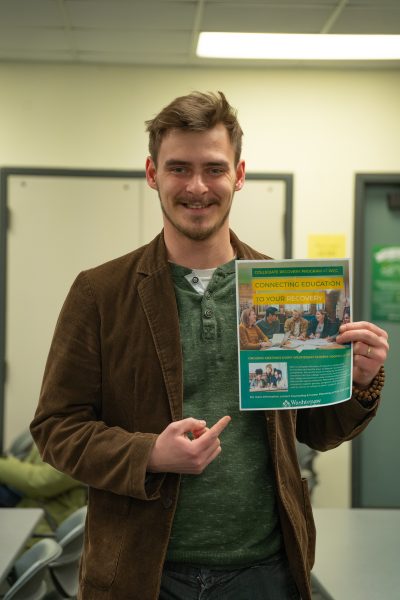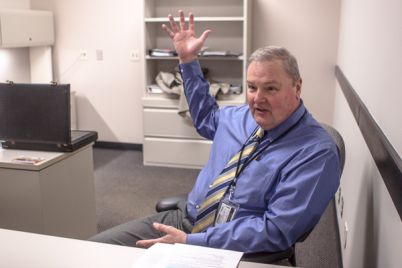
David Seaman, Collegiate Recovery Program president. Torrence Williams | Washtenaw Voice
By Lilly Kujawski | Editor and
Claire Convis | Deputy Editor
This year’s convocation student speaker was David Seaman, 27, a 4.0 WCC student, president of the WCC Collegiate Recovery Program and, as of Thursday, a semifinalist for the Jack Cooke Kent Foundation “Cooke Undergraduate Transfer Scholarship.”
In addition to the slew of academic accomplishments, Seaman had a personal victory to share with the audience during his speech at the Jan. 23 ceremony: to the date, he was celebrating three years of sobriety.
“Three years ago today, I walked into a detox center in Ann Arbor, coming from homelessness, destitution and incarceration, all resulting from an untreated substance abuse disorder,” Seaman said in his speech. “I had very few resources at my disposal; my family had given up hope for me, the legal system was ready to throw me in prison, friends had closed their doors; I had burned every bridge and didn’t have another couch to sleep on.”
In an interview with the Voice, Seaman said he dealt with a substance abuse disorder from early on in life.
“I couldn’t just go to a party and be done, it was something I did all the time,” said Seaman, who grew up in Oakland County.
Seaman first moved to Washtenaw County to seek treatment, but struggled to maintain sobriety. He ended up serving time in jail for a DUI. While in jail, Seaman had difficulty accessing treatment services. He went on program waitlists and wrote to his judge but still wasn’t able to get treatment.
Seaman had no resources or support systems waiting for him on the outside. He requested to be connected with a treatment center immediately following his release, but such assistance wasn’t provided. The barriers Seaman faced in accessing treatment services through the corrections system in part inspired Seaman’s current goal of transferring to the University of Michigan and studying linguistics and law.
During this time in jail, Seaman lost 12 of his friends to drug-related deaths.
“12 friends in 10 months… I felt really helpless, to have that happen; and angry,” Seaman said. “You can either let it be something that keeps you down, and continue to feel helpless… or you can take action, get involved, and be informed.”
“I used it as fuel… to why I’m doing what I’m doing, and why it’s so important to recover,” he said.
The decision to get sober was not an easy one to make, he said.
“There was this huge fear of being sick… and beyond that, this unknown life that I would lead in recovery, because getting high and drinking was definitely how I identified, how I saw myself,” Seaman said. “I couldn’t really imagine life without it.”
Seaman said he didn’t know the person he would be without drugs and whether he would even like that person.
“I wasn’t sure if I was gonna stay sober, if I had it in me, because I’d had so many failed attempts before,” Seaman said. “Asking for help was incredibly difficult.”
Ultimately, Seaman choose to get sober because his fear of returning to the life he’d been living was greater than his fear of an unknown life in sobriety, he said.
He received a scholarship to get into treatment and housing at Dawn Farm treatment center, and began taking classes at WCC.
Seaman relied on the counseling services at WCC and met with a counselor regularly to discuss his journey toward sobriety to help him stay on track.
Seaman works as the front-of-house manager at Detroit Street Filling Station, a vegan restaurant in Kerrytown, Ann Arbor with a business plan that puts an emphasis on supporting individuals in recovery through its partnership with Dawn Farm.
Seaman functions as an intermediary between Dawn Farm and Recovery is Good Business, a collective of Ann Arbor businesses committed to hiring individuals in recovery.
Seaman said that having a job, classes, meetings and a support group gives him a sense of purpose, direction and reason to stay sober. Seaman said he hopes that by pursuing a career in law, he’ll be able to “support individuals who have nothing” and to “give them something to live for.”
In the winter of 2019, the WCC Collegiate Recovery Program started on campus and Seaman has been involved since the beginning.
Seaman said that the group has been a great recovery network and allows students to build connections with each other.
“We can be in recovery and we can be in school and have this well-rounded life without drugs and alcohol,” Seamen said. “In order to live in recovery, the stigma around [substance abuse] needs to die.”
“David is an extremely generous and thoughtful human being,” said Teresa Herzog, the adviser of the CRP program. “He has both feet on the ground, and his authenticity just speaks volumes.”
“What resonates most about David’s story is that it’s a really, really common human story that people become addicted or dependent upon substances—it’s our nature,” said Herzog. “And we need to normalize it, and reach out, and end the stigma, and David is absolutely doing that. And he needs our help—he deserves our help and support.”

